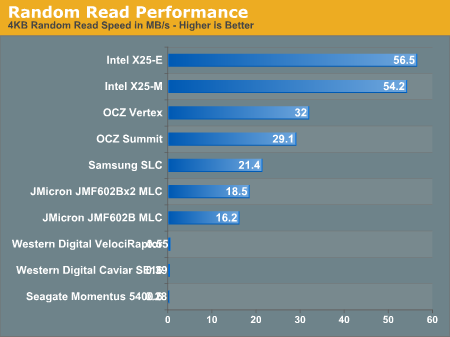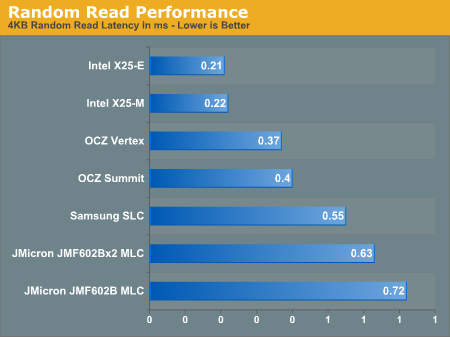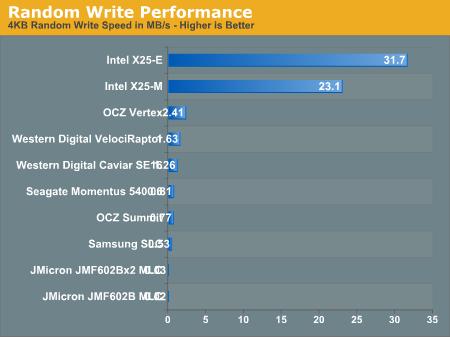The SSD Anthology: Understanding SSDs and New Drives from OCZ
by Anand Lal Shimpi on March 18, 2009 12:00 AM EST- Posted in
- Storage
Random Read/Write Performance
Arguably much more important to any PC user than sequential read/write performance is random access performance. It's not often that you're writing large files sequentially to your disk, but you do encounter tons of small file reads/writes as you use your PC.
To measure random read/write performance I created an iometer script that peppered the drive with random requests, with an IO queue depth of 3 (to add some multitasking spice to the test). The write test was performed over an 8GB range on the drive, while the read test was performed across the whole drive. I ran the test for 3 minutes.

The three hard drives all posted scores below 1MB/s and thus aren't visible on our graph above. This is where SSDs shine and no hard drive, regardless of how many you RAID together, can come close.
The two Intel drives top the charts and maintain a huge lead. The OCZ Vertex actually beats out the more expensive (and unreleased) Summit drive with a respectable 32MB/s transfer rate here. Note that the Vertex is also faster than last year's Samsung SLC drive that everyone was selling for $1000. Even the JMicron drives do just fine here.
If we look at latency instead of transfer rate it helps put things in perspective:

Read latencies for hard drives have always been measured in several ms, but every single SSD here manages to complete random reads in less than 1ms under load.
Random write speed is where we can thin the SSD flock:

Only the Intel drives and to an extent, the OCZ Vertex, post numbers visible on this scale. Let's go to a table to see everything in greater detail:
| 4KB Random Write Speed | |
| Intel X25-E | 31.7 MB/s |
| Intel X25-M | 23.1 MB/s |
| JMicron JMF602B MLC | 0.02 MB/s |
| JMicron JMF602Bx2 MLC | 0.03 MB/s |
| OCZ Summit | 0.77 MB/s |
| OCZ Vertex | 2.41 MB/s |
| Samsung SLC | 0.53 MB/s |
| Seagate Momentus 5400.6 | 0.81 MB/s |
| Western Digital Caviar SE16 | 1.26 MB/s |
| Western Digital VelociRaptor | 1.63 MB/s |
Every single drive other than the Intel X25-E, X25-M and OCZ's Vertex is slower than the 2.5" Seagate Momentus 5400.6 hard drive in this test. The Vertex, thanks to OCZ's tweaks, is now 48% faster than the VelociRaptor.
The Intel drives are of course architected for the type of performance needed on a desktop/notebook and thus they deliver very high random write performance.
Random write performance is merely one corner of the performance world. A drive needs good sequential read, sequential write, random read and random write performance. The fatal mistake is that most vendors ignore random write performance and simply try to post the best sequential read/write speeds; doing so simply produces a drive that's undesirable.
While the Vertex is slower than Intel's X25-M, it's also about half the price per GB. And note that the Vertex is still 48% faster than the VelociRaptor here, and multiple times faster in the other tests.










250 Comments
View All Comments
Natfly - Wednesday, March 18, 2009 - link
DangerMouse4269 - Tuesday, April 13, 2010 - link
Nicely written. Even a very out of practice Comp Eng understood that.geekforhire - Monday, June 14, 2010 - link
I have just replaced the hard drive in this 3 year old Dell Inspiron 9400 notebook computer with a new and very quick OCZ SSD, manually configured the partition with a 1024 offset, freshly installed the OS, freshly downloaded all of the latest and greatest drivers from Dell, and applied all currently available OS updates from Msft.The problem is that when the machine resumes from Standby, it will /reliably/ (4 out of 4 attempts) produce a BSOD 0xF4 after the power button is pressed to resume the machine from standby.
Here's the sequence to recreate the problem:
0) Machine is booted normally into Windows, and log in to an account which has administrative privs.
1) Click on Start -> Shut Down -> Standby.
2) See display turn black, disk I/O light flashes then stops, then the power indicator light begins to flash on and off slowly.
3) Wait until the power light has made 2 slow flashes.
4) Press the power button.
5) See the Dell Bios splash screen, then disappear
6) Boom: See the BSOD 0xF4
The values reported after the STOP are:
(0x00000003, 0x865b3020, 0x865b3194, 0x805d2954)
Note that I've been in contact with OCZ before about this SSD+computer, because the previous BSOD that was produced was 0x77. Their recommendation was to create the partition with an offset with a 64 interval, and to reflash the SSD with their modern firmware. This was done, the OS was reinstalled as described, and now I'm getting a different BSOD code. Another mention was a question whether the notebook computer uses a SATA2 controller (definitely compatible) or SATA1 (which may have troubles).
I've run Spinrite on the SSD, and there are lots of ECC errors being reported. I've been in contact with Spinrite, and they chalk this up to the SSD being chatty (which they like), but since SSD's are new and magnetic disks are common, they want to stay focussed on magnetic disks.
When the machine boots back up, the OS reports that a serious error has occurred, and asks that a problem report be submitted, which I do. Then an attractive but somewhat generic page is displayed with common causes (Aging or failing hard disks, large file transfers from secondary media to local hd, loss of power to a hard drive, hard disk intensive processes (eg: antivirus scanners), recently installed hardware that might have compatibility and performance problems)
Has anyone else encountered this kind of problem, and do you have any suggestions?
angavar - Thursday, September 9, 2010 - link
As a medical student I can appreciate a well researched and analytical article when I see it. This is by far the best computer hardware review I have ever read! Thank-you for your time and effort in producing what is clearly a thoroughly researched and detailed analysis.mac021 - Wednesday, October 17, 2012 - link
Thank you for the lesson and helping me understand SSD drives. May I just ask for your advice...For everyday use designing and generating prototypes for websites and running typical office s/w like word and excel for long documentations while listening to music or just having some video play in the background, then the occasional gaming of, say Star Craft 2 and Dead Space 3, and lets assume I do this on a 5 hours a day average for 365 days in a year, how long before I need to replace an OCZ Vertex/Summit SSD? And does format/reinstall help in prolonging the life of an SSD just as it does for my old hard drives (from a computer that's 6 years old and counting)? Or there's no stopping the SSD's death after reaching 10,000 times of being erased and rewritten on? I'm not one who keeps upgrading or buying new computer systems for every new thing that comes out, i'm more of a keeper and maintainer for as long as the system servers my needs... but when I make a purchase, I make sure it will be enough to last me another 6-12 years IF possible! Which is why I'm still considering SATA for my next purchase late this year or early next year (and I'm only buying a new PC just because I made a mistake buying a foxconn motherboard that can't support anything higher than XP, not even Vista... weird, anyway I found that out too late).
Also, would you know of a motherboard that supports SSD, Windows 8, Nvidea, third gen i5/i7, and up to 64GB ram?
Thanks so much!
windows10 - Wednesday, November 30, 2016 - link
This article is meaningfull, interesting. thank you for sharingsusanbones - Tuesday, September 12, 2017 - link
I was wondered to these many responses here.